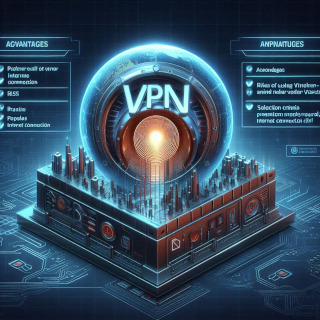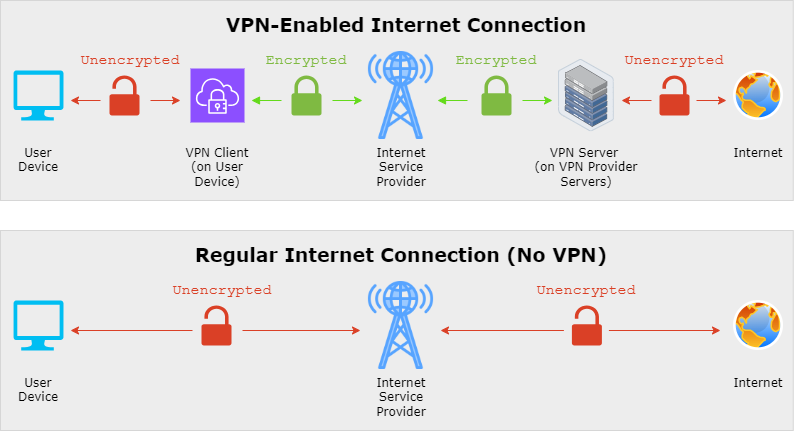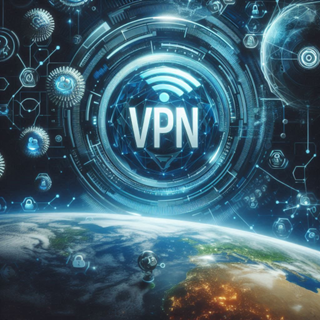What Is a VPN?
A Virtual Private Network (VPN) creates a secure and encrypted connection over the internet, allowing users to connect through a server operated by a VPN provider. This process masks the user's IP address and encrypts all data transmitted between their device and the internet, ensuring that online activities remain private and secure from hackers, government agencies, and even the user's Internet Service Provider (ISP).

VPNs also allow users to bypass geographic restrictions by routing their connection through a server in a different country. This makes it possible to access content that might be restricted in their region, such as certain streaming services or websites.
A VPN acts as a secure tunnel between your device and the internet, protecting your data from unauthorized access and keeping your online activities hidden.
- Advantages of Using a VPN
- Disadvantages of Using a VPN
- VPN vs. Regular Internet Connection: A Visual Comparison
- What to Look for When Selecting a VPN
- Risks of Not Using a VPN and Alternatives
- Popular VPN Solutions (Including some with a free plan/tier)
- Conclusion
Advantages of Using a VPN
Using a VPN offers several benefits, particularly in terms of security, privacy, and accessing restricted content.
- Enhanced Security: VPNs encrypt your data, making it nearly impossible for cybercriminals to intercept or decipher your information, which is especially important on public Wi-Fi networks.
- Increased Privacy: By masking your IP address, a VPN prevents websites, ISPs, and other entities from tracking your online activities, helping to maintain your anonymity on the web.
- Access to Geo-Restricted Content: One of the most popular uses of VPNs is bypassing geo-restrictions. VPNs allow you to connect to servers in different countries, enabling access to content that may be blocked in your region, such as streaming services like Netflix, Hulu, or BBC iPlayer, as well as region-specific websites and online services.
- Safe Online Shopping and Banking: A VPN provides an extra layer of security when conducting financial transactions online, protecting sensitive information from being stolen.
- Protection from Bandwidth Throttling: Some ISPs slow down your internet speed when they detect activities like streaming or downloading large files. A VPN can prevent this by hiding your online behavior from your ISP.
The advantages of using a VPN include enhanced security, privacy, and the ability to access geo-restricted content, making it an essential tool for many internet users.
Disadvantages of Using a VPN
While VPNs offer significant benefits, they also come with potential drawbacks.
- Reduced Internet Speed: Because a VPN routes your traffic through a remote server and encrypts your data, it can slow down your internet connection, which may be noticeable during streaming, gaming, or downloading.
- Cost: gh-quality VPN services typically require a subscription fee. Free VPNs exist, but they often come with limitations such as data caps, slower speeds, or even security risks.
- Limited Compatibility: Some websites and services actively block VPN traffic, meaning certain platforms, like streaming services or online banking sites, might not work properly when connected to a VPN. For instance, some streaming platforms are becoming more adept at detecting and blocking VPN usage, which can limit access to certain content.
- Complexity for Non-Tech-Savvy Users: Setting up and using a VPN can be challenging for those who are not tech-savvy, even though many VPNs aim to be user-friendly.
- Trust Issues with VPN Providers: Using a VPN means entrusting your internet traffic to the VPN provider. If the provider has poor security practices or logs user data, your privacy could be compromised rather than protected.
Understanding these disadvantages is crucial for making an informed decision about whether a VPN is right for you.
VPN vs. Regular Internet Connection: A Visual Comparison
When using the internet, the pathway your data takes can vary significantly depending on whether you're using a VPN (Virtual Private Network) or a regular internet connection. The following diagram provides a side-by-side (stacked) comparison of the key elements involved in both a VPN-Enabled Internet Connection and a Regular Internet Connection (No VPN). This comparison highlights how a VPN adds layers of security and privacy by encrypting your data and routing it through secure servers, while a regular connection leaves data more exposed to potential monitoring by ISPs or other third parties.

What to Look for When Selecting a VPN
Choosing the right VPN can be overwhelming, but focusing on key factors can help you make an informed choice.
- Security Features: Prioritize VPNs that offer strong encryption protocols, a kill switch, and DNS leak protection to ensure your privacy and security online.
- No-Logs Policy: Ensure the VPN provider has a strict no-logs policy, meaning they do not store any information about your online activities, which is vital for maintaining anonymity.
- Server Locations: A VPN with a large number of server locations gives you more options for bypassing geo-restrictions and ensuring a stable connection. The more diverse the server locations, the easier it is to access content from different regions around the world.
- Speed and Performance: Look for reviews or tests on the VPN's speed and performance, especially if you plan to use it for activities like streaming, gaming, or large downloads.
- Ease of Use: The VPN should have an intuitive interface and be easy to set up, with apps available for all your devices, including smartphones, tablets, and desktops.
- Customer Support: Reliable customer support is important, especially if you encounter issues. Look for a VPN provider that offers 24/7 support through multiple channels, like chat, email, or phone.
- Price: Compare costs and ensure the features justify the price. Be cautious of free VPNs, as they often come with limitations or hidden trade-offs, such as selling your data.
Focusing on these considerations will help you select a VPN that meets your specific needs and provides the security and privacy you require.
Risks of Not Using a VPN and Alternatives
Neglecting online security can have serious consequences. Here's a look at the risks of not using a VPN and some alternative methods to protect your privacy.
Risks of Not Using a VPN
- Data Interception: Without a VPN, your data is vulnerable to interception by hackers, especially on public Wi-Fi networks, leading to potential identity theft, financial loss, and other security breaches.
- Online Tracking: ISPs, advertisers, and government agencies can easily track your online activities without a VPN, using this information for targeted ads, surveillance, or selling it to third parties.
- Geo-Restrictions: Without a VPN, you may be unable to access certain websites, streaming services, or other online content restricted based on your geographic location. This means missing out on content that might be available in other countries but is blocked in your region.
- Censorship: In countries with strict internet censorship, not using a VPN can prevent you from accessing vital information or communicating freely.
Alternatives to VPNs
- Proxy Servers: Proxy servers act as intermediaries between your device and the internet, masking your IP address but generally not offering the same level of encryption as VPNs.
- Tor Browser: The Tor network anonymizes your internet traffic by routing it through multiple volunteer-operated servers. While offering strong privacy, Tor can be slow and is sometimes blocked by websites.
- HTTPS Everywhere: This browser extension ensures you connect to websites over HTTPS, providing a secure, encrypted connection. However, it only works on websites that support HTTPS and doesn't hide your IP address.
- Security Software: Antivirus software, firewalls, and anti-malware tools can protect your device from cyber threats, though these solutions do not offer the privacy benefits of a VPN.
Not using a VPN exposes you to significant risks, including data interception, online tracking, and censorship. While alternatives exist, they often lack the comprehensive security and privacy features provided by a VPN.
Popular VPN Solutions

Below is an overview of some of the most popular VPN solutions available out there, each offering unique features to cater to different user needs.
- ExpressVPN
Known for its high-speed servers and strong security features, ExpressVPN offers over 3,000 servers in 94 countries. It provides robust encryption, a no-logs policy, and a user-friendly interface. It's ideal for streaming, torrenting, and bypassing censorship.
- NordVPN
NordVPN is renowned for its double VPN encryption, which routes your connection through two servers for enhanced security. With over 5,400 servers in 60 countries, it also offers features like CyberSec for blocking ads and malware, and specialized servers for P2P and streaming.
- Surfshark
A budget-friendly option, Surfshark allows unlimited device connections per account. It features CleanWeb for ad-blocking, MultiHop for extra security, and a strict no-logs policy. Despite its lower price, it still offers high-speed servers across 100+ locations.
- CyberGhost
CyberGhost stands out with its user-friendly interface and specialized servers for streaming and torrenting. It has a vast network of over 9,000 servers in 90+ countries, strong encryption, and a strict no-logs policy, making it a solid choice for both beginners and advanced users.
- Private Internet Access (PIA)
PIA is favored for its strong privacy features, including advanced encryption options and a no-logs policy. It offers over 10,000 servers in 84 countries and includes features like a built-in ad blocker and support for P2P file sharing.
- ProtonVPN
Created by the team behind ProtonMail, ProtonVPN focuses on privacy with its Secure Core architecture, which routes traffic through privacy-friendly countries. It offers a free tier with no data limits, and premium options include access to over 1,800 servers in 66 countries.
- IPVanish
IPVanish is known for its strong encryption, unlimited simultaneous connections, and support for torrenting. It has over 2,000 servers in 50+ countries and includes advanced features like split tunneling and a zero-logs policy.
- VyprVPN
VyprVPN offers strong security with its proprietary Chameleon protocol, which helps bypass VPN blocking. It operates its own servers in over 70 locations worldwide, ensuring high performance and privacy with a no-logs policy.
- Hotspot Shield
Hotspot Shield is popular for its fast speeds, thanks to its proprietary Catapult Hydra protocol. It has over 3,200 servers in 80+ countries and offers a free tier with limited features. Premium users benefit from advanced security features and optimized streaming servers.
- TunnelBear
Known for its approachable design and ease of use, TunnelBear is a great option for VPN beginners. It offers a free plan with 500MB of data per month and has servers in 47 countries. While it doesn't offer as many advanced features as other VPNs, its simplicity and strong security make it a popular choice.
Conclusion
VPNs are crucial for enhancing online security, privacy, and freedom. While they have potential downsides, such as reduced internet speeds and costs, their benefits make them an essential tool for many users. When choosing a VPN, prioritize security features, a no-logs policy, and wide server availability, especially if you're looking to access geo-restricted content. Additionally, understanding the risks of not using a VPN and considering alternative security measures will help you protect your digital life effectively.


